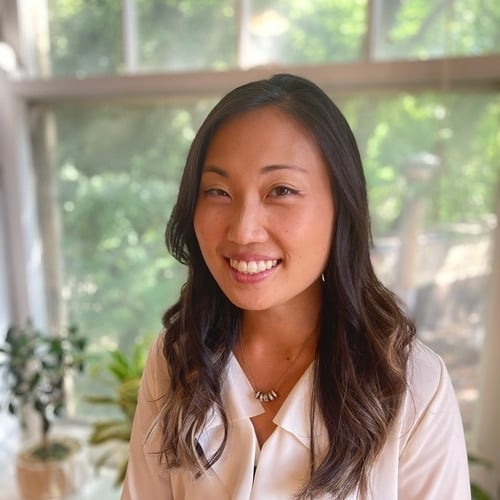-

Teacher
Lincoln Park High School
My story
I am a proud Korean-American daughter of two relentlessly hard-working and sacrificially loving parents who immigrated to the U.S. over 40 years ago. I was made aware of both the privileges and disadvantages of growing up in an immigrant family, witnessing my parents persistently navigating the obstacles of an unfamiliar culture and language. They set an example of hard work, perseverance, and sacrifice that drives much of the work I do today. Their history of overcoming struggle and poverty to provide me with access to opportunities both humbles me with gratitude and inspires me to be intentional about my life choices and what impact I am making on future generations.
After graduating college with an architecture degree, I lived and worked in Detroit splitting my time as an architectural intern at a community design center as well as a paraprofessional at a public Detroit high school. These experiences awakened me to the deep social, economic, and educational inequities that exist, and I began to see the world of design and education as a powerful intersection in creating transformative changes in a city and society at large. As Detroit was facing severe disinvestment and city-wide issues at the time, I saw how architectural design could provide improved structures and spaces to facilitate stronger neighborhoods, but I knew educating youth would cultivate longer-lasting changes in communities for generations to come.
Why I choose to engage in equity work
Working with youth, listening and learning from their stories, led me to dedicate my future to education. Although I never imagined myself becoming a high school teacher, I found that having the opportunity to empower and equip young people at such a formative time in their lives was essential in developing future leaders who could break cycles of inequity. I was selected as a Woodrow Wilson Teaching Fellow, which afforded me the opportunity to earn a master’s degree in education and teaching certification. I taught high school math for several years in Detroit before moving to Chicago to teach at Lincoln Park High School, where the extremely diverse backgrounds and learning needs of the students challenge me to continue the work of equity every day.
The passion and conviction that led me into the field of education is rooted in a desire to see equitable outcomes for all young people, regardless of race, ethnicity, and socio-economic status. I’m dedicated to creating a culturally responsive learning environment and implementing project-based learning into my math classroom in an effort to break away from traditional structures and systems that have prevented all students from succeeding. Using my design background, I try to offer a creative approach in both instruction and assessment by implementing projects that utilize mathematical thinking and knowledge while engaging student interests, local issues, and other life skills necessary for civic leadership. I try to anchor these learning experiences in the context of a student’s neighborhood and/or immediate community in order to simultaneously develop empathy and agency. Students are empowered to design solutions with a mathematical lens to address complex issues that directly affect them.
My equity challenge and how I work on it
Math anxiety and a fixed mindset are aggressively persistent challenges in a math classroom. When students claim “I’m just not a math person,” it prevents them from wielding the power to overcome challenges - even if it’s just a seemingly trivial algebra problem. I want to empower students to believe they can be effective problem-solvers, using mathematics to strengthen their critical thinking skills. When students can change their perception of themselves and their abilities, I believe they develop a sense of agency that can be extended beyond the classroom.
What sustains me when equity work stalls, how do I stay motivated when the work gets hard, and how do I push myself and others to advance equity
Self-reflection is a core part of who I am. When things get tough, I try to take a step back to remember my “why” and reflect on my students, their stories, and the hope of their future. My connection to my personal and professional community is extremely important in sustaining my motivation in equity work. Surrounding myself with equity-focused educators who I can collaborate with and learn from helps me to continue the work because I know that I’m not doing it alone. I’m continually inspired by other teachers in my school and across the district that are doing amazing work which challenges me to keep learning. Connecting with my spirituality and a close group of family and friends is important in nourishing my soul and re-energizing my sense of purpose. Though my efforts in advancing equity are imperfect, I’m reminded that the work is ongoing and every victory along the way, big or small, makes it worth the fight.
